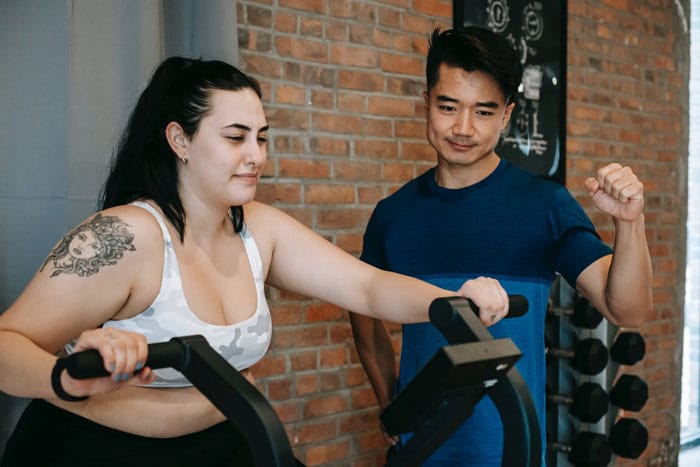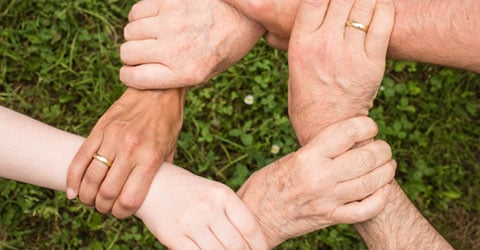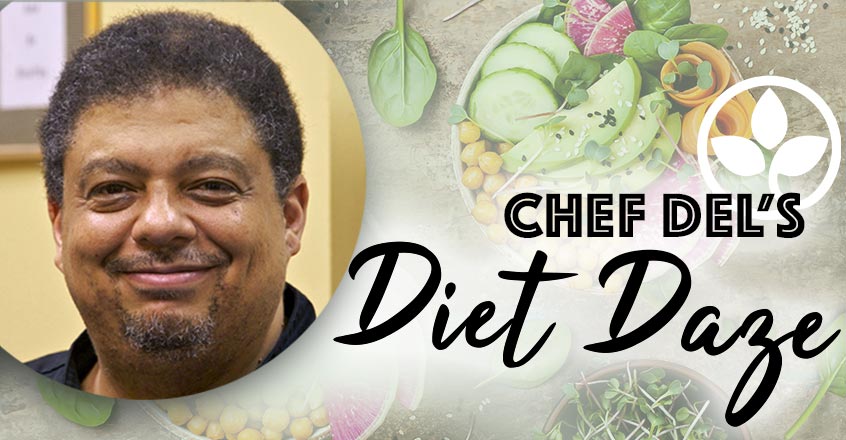

Roberta Russell writes in her book The Report on Permanent Weight Loss that those who successfully lose weight and keep it off for a long period of time have several things in common: one of those things is support. I hear from people all the time that they lack support from friends or family who just don’t understand what it’s like to struggle with weight loss. It’s not that they don’t care or are unwilling to help, but that they don’t know how to be supportive. On top of that, family and friends can be just as exhausted by your struggle to lose weight as you are.

I have many friends in the real world who can be incredibly supportive, and my brother is one of those people. When he is focused on his health, the world joins in with him and he structures his whole life around his health goals. There is no way of swaying him from that focus…until something sways him! And I am a wanderer and always have been. I have the uncanny ability to be focused for a period of time and then do a 180-degree turn and become “bingey.” I see an ad for potato chips on the television and I have to have potato chips. That is the nature of a binge-and-starve eater. The problem with my brother as one of my main supports is that when we go off the plan, we do it in a major way. We are each other’s trigger for healthy and unhealthy habits. Suddenly, movie night becomes an excuse for potato chips, red wine, and chocolate. So, what do I do to minimize the possibility of a potato chip binge? Here are a few of my tools:
- When I am visiting my brother, I make sure to communicate my desire to eat healthy. It puts the thought into his head so that he can plan for it. He will do so by getting any unhealthy food out of the house and stocking up on those healthy foods that support both of our health goals: fresh fruits and vegetables, beans, and grains. It also makes me commit to what I plan to do. By making that desire for healthy eating more than just a thought in my head, I give it life and momentum. You can do the same. Communicate your health goals with those around you and those with whom you spend most of your time. They can help keep you accountable and on track, which speaks to my next point.
- I have friends who are also a part of my support group, and some of them remind me of my goals without my having to ask them. My friend Edie, who is also my next-door neighbor, knows that when I am visiting my brother, we are likely to binge if we do not plan to do differently. So, Edie will remind me of my goals and the reason for them: life with less pain, freedom of movement, and generally good health. I make these goals my mantra by listing them each morning when I am making my coffee. Edie will also call me up if she hasn’t heard from me for a few days, as she knows that when I isolate myself I have the tendency to eat unhealthy foods. Others can help hold you accountable, but saying your goals out loud to yourself can also help hold yourself accountable. Make an easy habit of reminding yourself, out loud, of your goals every day by saying them or associating them with an action you take each day, like making morning coffee, brushing your teeth, or when you see yourself in the mirror.
- We created CNS Kitchen, a free interactive community, in part because I wanted a support system to help me stay focused on weight loss and because I knew several people who were also looking for that kind of support. This group does not replace live human interaction for me but instead gives me an additional layer of support in a nonjudgmental environment. Members thank me often for the group, and many have commented on the progress they have made since joining it. Although it is a private group, we are always looking for new members who need help or who want to help others with weight loss. Join our supportive online community to help achieve your weight loss goals.
- I have a weight loss coach. I cannot expect my friends to babysit me all the time, and as I said earlier, my friends and family eventually get diet fatigue the same way I do. So, I need to learn the skills necessary to obtain and maintain optimal health. A good weight loss coach can help me do just that. Weight loss coaches are usually certified in life coaching and hopefully have an awareness of the benefits of a whole food, plant-based diet. Be careful of those who want to steer you toward a certain kind of diet or who are trying to sell you a product. They don’t necessarily have your best interest at heart.
- My most important tool is myself. I have to incorporate all of the other tools I use into my daily life and commit to them every day. In other words, I am the engine that makes my own change possible, and I do anything I put my mind to. Outside support helps, but I need to support myself as well by staying focused on my goals and by asking for help when I need it. Don’t be afraid to ask for help, support, or direction- and hold yourself accountable.
My most important tool is myself. I have to incorporate all of the other tools I use into my daily life and commit to them every day. In other words, I am the engine that makes my own change possible, and I do anything I put my mind to.

Copyright 2026 Center for Nutrition Studies. All rights reserved.
Deepen Your Knowledge With Our
Plant-Based Nutrition
Certificate
Plant-Based Nutrition Certificate
- 23,000+ students
- 100% online, learn at your own pace
- No prerequisites
- Continuing education credits





